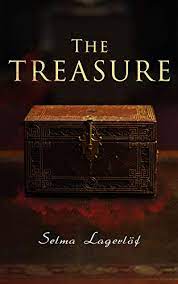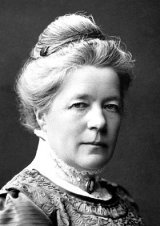The Treasure Page #4
The Treasure is a 1904 novel by the Swedish writer Selma Lagerlof. Its original Swedish title is Herr Arnes penningar, which means "Mr. Arne's money". It has also been published in English as Herr Arne's Hoard. Set in Bohuslän in the 16th century, it tells the story of a group of Scottish mercenaries who escape from prison; they go on to murder a family to steal a treasure chest, after which one of them falls in love with the family's sole survivor.
When first the girl came to the town she sat and wept from morning to night. She bewailed Herr Arne and his household, and lamented that she had lost all who were dear to her. Most of all she wept for her foster sister, and said she wished she had not hidden herself against the wall, so that she might have shared death with her. Torarin's mother said nothing to this so long as her son was at home. But when he had gone on his travels again she said one morning to the girl: "I am not rich enough, Elsalill, to give you food and clothing that you may sit with your hands in your lap and nurse your sorrow. Come with me down to the quays and learn to clean fish." So Elsalill went with her down to the quays and stood all day working among the other fish cleaners. But most of the women on the quays were young and merry. They began to talk to Elsalill and asked her why she was so silent and sorrowful. Then Elsalill began to tell them of the terrible thing that had befallen her no more than three nights ago. She spoke of the three robbers who had broken into the house by the smoke-hole in the roof and murdered all who were near and dear to her. As Elsalill told her tale a black shadow fell across the table at which she worked. And when she looked up three fine gentlemen stood before her, wearing broad hats with long feathers and velvet clothes with great puffs, embroidered in silk and gold. One of them seemed to be of higher rank than the others; he was very pale, his chin was shaven, and his eyes sat deep in his head. He looked as though he had lately been ill. But in all else he seemed a gay and bold-faced cavalier, who walked on the sunny quays to show his fine clothes and his handsome face. Elsalill broke off both work and story. She stood looking at him with open mouth and staring eyes. And he smiled at her. "We are not come hither to frighten you, mistress," said he, "but to beg that we too may listen to your tale." Poor Elsalill! Never in her life had she seen such a man. She felt she could not speak in his presence; she merely held her peace and cast her eyes upon her work. The stranger began again: "Be not afraid of us, mistress! We are Scotsmen who have been in the service of King John of Sweden ten full years, but now have taken our discharge and are bound for home. We have come to Marstrand to find a ship for Scotland, but when we came hither we found every channel and firth frozen over, and here we must bide and wait. We have no business to employ us, and therefore we range about the quays to meet whom we may. We should be happy, mistress, if you would let us hear your tale." Elsalill knew that he had talked thus long to let her recover from her emotion. At last she thought to herself: "You can surely show that you are not too homely to speak to a noble gentleman, Elsalill! For you are a maiden of good birth and no fisher lass." "I was but telling of the great butchery at Solberga parsonage," said Elsalill. "There are so many who have heard that story." "Yes," said the stranger, "but I did not know till now that any of Herr Arne's household had escaped alive." Then Elsalill told once more of the wild robbers' deed. She spoke of how the old serving-men had gathered about Herr Arne to protect him and how Herr Arne himself had snatched his sword from the wall and pressed upon the robbers, but they had overcome them all. And the old mistress had taken up her husband's sword and set upon the robbers, but they had only laughed at her and felled her to the floor with a billet of wood. And all the other women had crouched against the wall of the stove, but when the men were dead the robbers came and pulled them down and slew them. "The last they slew," said Elsalill, "was my dear foster sister. She begged for life so piteously, and two of them would have let her live; but the third said that all must die, and he thrust his knife into her heart." While Elsalill was speaking of murder and blood the three men stood still before her. They did not exchange a glance with each other, but their ears grew long with listening, and their eyes sparkled, and sometimes their lips parted so that the teeth glistened. Elsalill's eyes were full of tears; not once did she look up whilst she was speaking. She did not see that the man before her had the eyes and teeth of a wolf. Only when she had finished speaking did she dry her eyes and look up at him. But when he met Elsalill's glance his face changed in an instant. "Since you have seen the murderers so well, mistress," said he, "you would doubtless know them again if you met them?" "I have no more than seen them by the light of the brands they snatched from the hearth to light their murdering," said Elsalill; "but with God's help I'll surely know them again. And I pray to God daily that I may meet them." "What mean you by that, mistress?" asked the stranger. "Is it not true that the murderous vagabonds are dead?" "Indeed, I have heard so," said Elsalill. "The peasants who set out after them followed their tracks from the parsonage down to a hole in the ice. Thus far they saw tracks of sledge-runners upon the smooth ice, tracks of a horse's hoofs, tracks of men with heavy nailed boots. But beyond the hole no tracks led on across the ice, and therefore the peasants supposed them all dead." "And do you not believe them dead, Elsalill?" asked the stranger. "Oh, yes, I think they must be drowned," said Elsalill; "and yet I pray to God daily that they may have escaped. I speak to God in this wise: 'Let it be so that they have only driven the horse and the sledge into the hole, but have themselves escaped.'" "Why do you wish this, Elsalill?" asked the stranger. The tender maid Elsalill, she flung back her head and her eyes shone like fire. "I would they were alive that I might find them out and seize them. I would they were alive that I might tear their hearts out. I would they were alive that I might see their bodies quartered and spiked upon the wheel." "How do you think to bring all this about?" said the stranger. "For you are only a weak little maid." "If they were living," said Elsalill, "I should surely bring their punishment upon them. Rather would I go to my death than let them go free. Strong and mighty they may be, I know it, but they would not be able to escape me." At this the stranger smiled upon her, but Elsalill stamped her foot. "If they were living, should I not remember that they have taken my home from me, so that I am now a poor lass, compelled to stand here on the cold quay and clean fish? Should I not remember that they have slain all those near to me, and should I not remember most of all the man who plucked my foster sister from the wall and slew her who was so dear to me?" But when the tender little maid gave proof of such great wrath, the three Scottish campaigners burst out laughing. So full of merriment were they that they went off, lest Elsalill might take offence. They walked across the harbour and up a narrow alley which led to the market-place. But long after they were out of sight Elsalill heard their roars of loud and scornful laughter.
Translation
Translate and read this book in other languages:
Select another language:
- - Select -
- 简体中文 (Chinese - Simplified)
- 繁體中文 (Chinese - Traditional)
- Español (Spanish)
- Esperanto (Esperanto)
- 日本語 (Japanese)
- Português (Portuguese)
- Deutsch (German)
- العربية (Arabic)
- Français (French)
- Русский (Russian)
- ಕನ್ನಡ (Kannada)
- 한국어 (Korean)
- עברית (Hebrew)
- Gaeilge (Irish)
- Українська (Ukrainian)
- اردو (Urdu)
- Magyar (Hungarian)
- मानक हिन्दी (Hindi)
- Indonesia (Indonesian)
- Italiano (Italian)
- தமிழ் (Tamil)
- Türkçe (Turkish)
- తెలుగు (Telugu)
- ภาษาไทย (Thai)
- Tiếng Việt (Vietnamese)
- Čeština (Czech)
- Polski (Polish)
- Bahasa Indonesia (Indonesian)
- Românește (Romanian)
- Nederlands (Dutch)
- Ελληνικά (Greek)
- Latinum (Latin)
- Svenska (Swedish)
- Dansk (Danish)
- Suomi (Finnish)
- فارسی (Persian)
- ייִדיש (Yiddish)
- հայերեն (Armenian)
- Norsk (Norwegian)
- English (English)
Citation
Use the citation below to add this book to your bibliography:
Style:MLAChicagoAPA
"The Treasure Books." Literature.com. STANDS4 LLC, 2025. Web. 10 Mar. 2025. <https://www.literature.com/book/the_treasure_6>.








Discuss this The Treasure book with the community:
Report Comment
We're doing our best to make sure our content is useful, accurate and safe.
If by any chance you spot an inappropriate comment while navigating through our website please use this form to let us know, and we'll take care of it shortly.
Attachment
You need to be logged in to favorite.
Log In